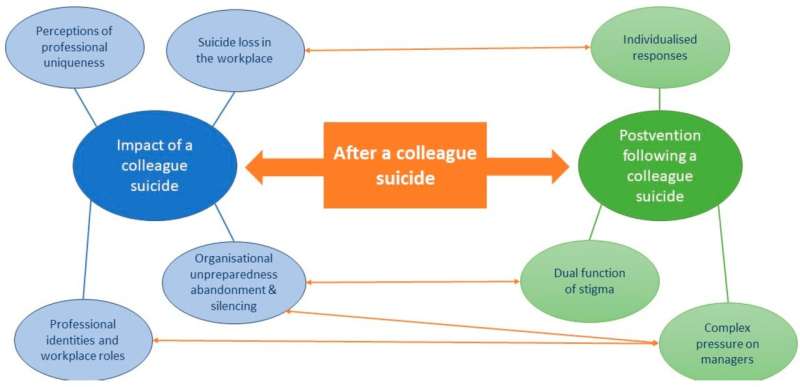This article has been reviewed according to Science X's editorial process and policies. Editors have highlighted the following attributes while ensuring the content's credibility:
fact-checked
peer-reviewed publication
trusted source
proofread
New guidance to support NHS staff after the suicide of a colleague

Researchers from the University of Surrey, University of Birmingham, and Keele University gathered evidence and data over the course of two years, as part of a study which has informed a robust set of new evidence-based postvention guidance to support NHS staff after the death by a suicide of a colleague.
Suicide rates for health professionals are 24% higher than the national average, with suicide among female nurses being four times higher than the national average. Those affected by the suicide of another are themselves subsequently shown to be at greater risk of mental illness and suicide.
Previous research has highlighted that providing support early to help those affected by suicide can enable them to better come to terms with this and reduce risks of mental illness and suicide. This early support is called postvention, which the study aimed to provide guidance around.
The new published postvention guidance is intended to be a resource and guide for use in training, and in the delivery of postvention support following the death of a colleague by suicide.
"This new postvention guidance will enable NHS leaders and managers to better support colleagues affected by suicide within the NHS. Postvention is key in supporting the well-being of those affected, and this evidence-based guidance will help to create a system where this support is safe and effective," says Dr. Nikolaos Efstathiou, co-investigator of NHS Postvention study, University of Birmingham.
The guidance was informed by a study published in the International Journal of Environmental Research and Public Health, and funded by the National Institute for Health Research, Health Service and Delivery Research (NIHR), in which a multidisciplinary team of researchers in clinical settings, academia, the charity sector, and front-line medical workers identified the impact on NHS staff following a colleague's suicide and how their needs can be supported.
Prior to this study, there was no postvention guidance available to provide NHS organizations or managers with to support NHS colleagues who may be affected. The new guidance was underpinned by the study's systematic review of existing guidance and academic literature, in-depth interviews with 51 NHS staff affected by a colleague's suicide, and a stakeholder workshop attended by 68 NHS stakeholders.
The study team are now calling on NHS senior leaders, decision-makers and policymakers to utilize the new guidance, and ensure that every NHS Trust and Integrated Care Board (ICB) in the UK has a dedicated postvention team to respond quickly and safely to the needs of NHS staff.
More information: Hilary Causer et al, The Impact of Colleague Suicide and the Current State of Postvention Guidance for Affected Co-Workers: A Critical Integrative Review, International Journal of Environmental Research and Public Health (2022). DOI: 10.3390/ijerph191811565


















